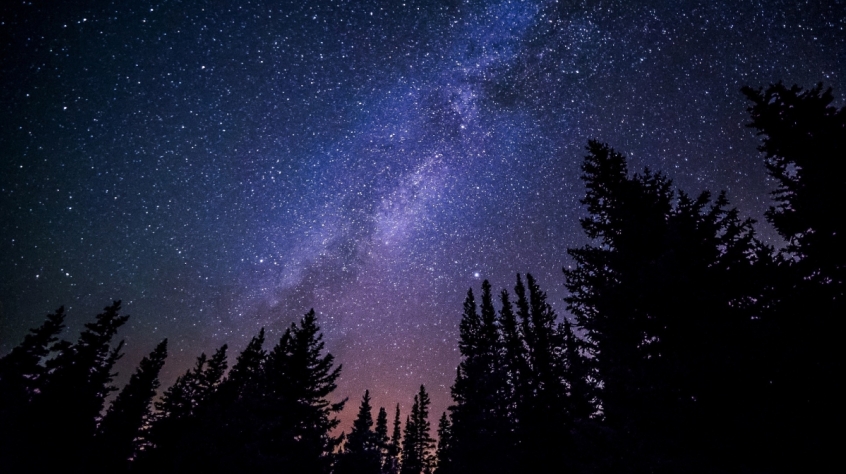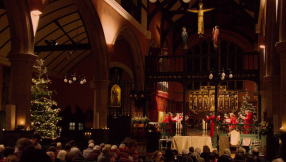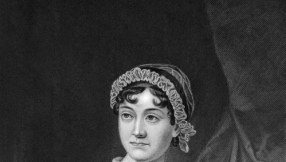I have seen something else under the sun:
The race is not to the swift or the battle to the strong,
nor does food come to the wise or wealth to the brilliant
or favour to the learned;
but time and chance happen to them all.
Moreover, no one knows when their hour will come:
As fish are caught in a cruel net, or birds are taken in a snare,
so people are trapped by evil times
that fall unexpectedly upon them (Ecclesiastes 9: 11-12).
I recently went to an art exhibition where an artist reflected on what he had seen in an observatory and the enormous artistry of the stars. Looking at the stars and reflecting on our surroundings and our place in the world, the artist says 'there has to be more than religion'. That is where we are at in our study of Ecclesiastes. Solomon is reflecting on life and he is stating that there must be something more.

How do we view life? What kind of world view do we have? Closed or open? Closed is when, faced with the big questions of life (or even just the small headaches and the daily grind), we have a set of parameters, beliefs which enable us to cope. Anything out of that we do not accept. In other words we create our own wee universe with ourselves at the centre – and the being of God as at best peripheral, there if it suits us and we need him but easily discarded and disregarded if he doesn't fit.
An open system is where we acknowledge that there are many things we do not know, that we are not in control, that we are not God. That is scary and risky but it is really the only option if we are to really live our lives to the full and realistically. It allows us to ask the questions Solomon asks without necessarily having to have all the answers.
Solomon again considers life under the sun – and he considers in this section (9: 11 to the end of chapter 10) two ways to live – the wise and the foolish. Some think these verses are like proverbs with little or no connection, but I think the connection is wisdom and especially foolishness. So how do we live this meaningless life?
The first part, at the end of chapter 9, tells us about the limits of wisdom. In the chapters before Solomon has been arguing about matters of life and death. In these verses he looks into some of the more mundane daily realities. He argues that there is a common-sense approach to life but that human foolishness blinds us to much of that.
His first point is that life is random -(9:11-12). The first response to the previous chapter is along the lines of, 'If death is unavoidable then you should live to your strengths, work hard, achieve some success.' But, says Solomon, life is not predictable. You would expect the fastest person to win the race, the strongest the battle. The most intelligent to have the best things in life. But that is not the way. Our abilities are no guarantee to success. Time and chance happen to them all.
Throughout Ecclesiastes we are told that time limits us. Our times are in God's hands. Here we are also told about chance. There appears to be a randomness about human existence. One does not get what one deserves and outcomes happen unexpectedly and suddenly. Death interrupts. Time and chance happen to all. Fish are swimming along quite happily, birds are flying and then they are struggling suddenly in a trap. That is the same with humans.
He has just said, 'enjoy life'. He now says 'while you can', because who knows what will happen. It is the same old story – carpe diem – seize the day.
Because of time and chance, there is no way one can prepare for victorious living where we are always guaranteed success. That leads him to some degree of frustration. In this, Solomon seems to be saying the same thing that Richard Dawkins argues in his book Out of Eden: 'In a universe of electrons and selfish genes, blind physical forces and genetic replication, some people are going to get hurt, other people are going to get lucky, and you won't find any rhyme or reason in it, nor any justice. The universe that we observe has precisely the properties we should expect if there is, at bottom, no design, no purpose, no evil, no good, nothing but pitiless indifference.'
That's a bleak view of the universe. There is no rhyme, reason, justice, design, purpose, evil, good in a Godless universe ('under the sun') – just pitiless indifference. The Oxford professor with his money and lovely lifestyle may think 'that's just the way the cookie crumbles – get over it and accept your lot'.
But should the man suffering from oppression and poverty just accept 'time and chance' happens to everyone and his karma was just bad? No – life is not reduced to a lottery, nor do we live in a moralistic universe where the good get what they deserve and the bad get what they deserve. We don't live in a bleak and meaningless universe, nor do we live in a just one. Because our universe is bent and crooked, the effects of sin distort and pervert our world. But there is a God who will one day make all things just, on the day of judgment he has appointed. And there is a God who so loved the world that he gave his only son, that whoever believes in him would not perish. The renewal of all things, including the heavens and the earth, will come.
When faced with the realities of time and chance, Paul's response is somewhat different: 'It does not, therefore, depend on man's desire or effort, but on God's mercy' (Romans 9:16). Human inability drives Paul to God's mercy and grace. The randomness of life should drive us to God. 'Now listen, you who say, "Today or tomorrow we will go to this or that city, spend a year there, carry on business and make money." Why, you do not even know what will happen tomorrow. What is your life? You are a mist that appears for a little while and then vanishes. Instead, you ought to say, "If it is the Lord's will, we will live and do this or that"' (James 4:13-15).
Under the sun (without God) you are left with a Dawkeynsian bleak view of the universe. With the Son we have the hope of a glorious and renewed creation. Take your pick!
David Robertson is associate director of Solas CPC in Dundee and minister at St Peter's Free Church. Follow him on Twitter @TheWeeFlea













